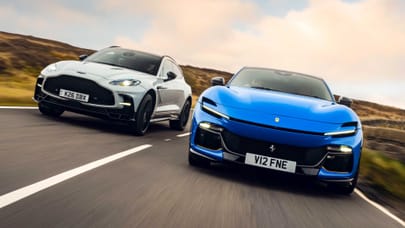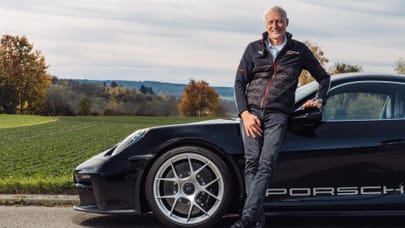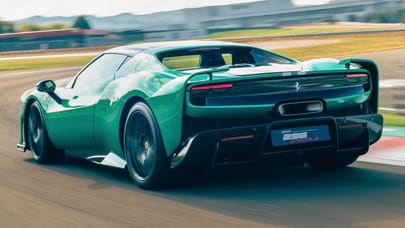
Electric car news - Germans take charge - 2010
Ah, two blokes in suits shaking hands in front of an ordinary car with signwriting on it. We get emailed these photos every single day. The senders think such a picture will catch your eye. It won't.
Which is a pity because there is interest in the story that lies behind the image.
The German car industry has signed up to a German Government push to get a million electric cars onto the roads by 2020. If they manage it, we're talking about one in four new cars sold in that year being electric. That's a staggering change in just the next 10 years.
To see how seismic it is, think how little the new-car market has changed in the past 10 years. A decade ago, new Mini had already been introduced. Cars then weren't much different from cars now, and nor was their source of energy. Yet the Germans expect that a quarter of the cars sold in 2020 to run on a different form of energy.
The picture, by the way, is VW engineering boss Ulrich Hackenberg (a clever bloke and a true car nut) standing alongside a man in a blue suit. He's the German Federal Minister for traffic, building and town development, Dr Peter Ramsauer. Oh yes.
Now you might not want a fellow with Ramsauer's job title round your place for a few beers. But the fact he's in the photo is a firm reminder of why Germany has such a strong car industry. Because they all pull together: industry, universities, unions and the Government.
In this case, they've formed something called the National Platform for Electric Mobility, and Chancellor Angela Merkel showed up for the launch event.
So when they say they'll sell all these electric cars, they probably will. Because all the car makers have signed up to the initiative (indeed BMW's R&D chief is in the chair) and so have power companies, towns and the Government. Which means there really will be an infrastructure to support the cars.
Mr Chicken, allow us to introduce you to Mr Egg.
So what cars will we get out of it? Well, BMW will have its new Megacity car, a lightweight carbon-fibre-structure machine that will probably debut at the London Olympics before going on sale in 2013. Mercedes will have Smarts and A-Class-type vehicles, plus a whole range of plug-in hybrids. There will be an electric VW Up!
Top Gear
Newsletter
Thank you for subscribing to our newsletter. Look out for your regular round-up of news, reviews and offers in your inbox.
Get all the latest news, reviews and exclusives, direct to your inbox.
And the car in the photo is a Golf prototype with a 12-sec 0-62 time and a claimed 90-mile range from lithium-ion batteries under the boot and in the centre tunnel. It will go into production, in the Mk7 bodyshell, in 2013. Although in real-world driving it will probably be sputtering into voltage-challenged stasis long before 90 miles. Electric cars never make claimed figure. (Of course, petrol and diesel cars never make their stated tank range either.)
In the same year, VW has also promised a plug-in hybrid Golf, called Twin Drive. It uses a smaller number of the same batteries, but adds a three-cylinder engine clutched in alongside the electric motor for when the batteries go down. Then there's Audi's Wankel-engined plug-in hybrid A1 we saw at the Geneva show: that'll make production around the same time.
Strangely, a couple of years back, the bosses of VW said electric cars would only make two or three percent of the market by 2020. Now their prediction is 10 times as great.
In related news, German electric utility E.ON says it has spare night power capacity to charge 10 million electric vehicles.
And although the electric Mini can only really do about 60 miles safely between charges, most owners say that isn't as much of a problem as they thought it would be. So that's alright then.
(Oh and by the way, for those of you who will point out, as you always do, that electric cars are merely coal-fired cars and therefore ‘not green', here's my usual disclaimer:
Power stations burning fossil fuels are more efficient by a factor of at least three - approx 75 percent versus approx 25 percent - than even the best diesel car engines. And high-voltage energy transmission along the national grid results in very little lost energy. Batteries and electric motors are extremely efficient, too. So electric cars, even if using fuel from oil-fired or coal-fired power stations, mean less fuel is burned and less CO2 emitted than petrol or diesel cars.)
Paul Horrell, Consultant Editor of TopGear magazine.
Trending this week
- 2026 TopGear.com Awards
"Engineering at the cutting edge": why the Ferrari F80 is our hypercar of the year








